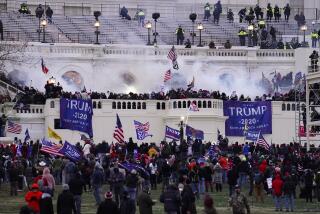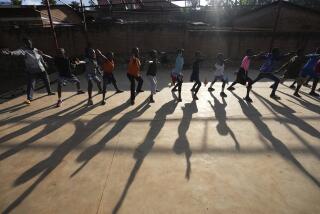Zimbabwe’s shattered opposition
TEMBISA, SOUTH AFRICA — They were some of the toughest front-liners in Zimbabwe’s opposition, people who previously had been beaten and tortured by state security forces and come through it stronger.
Now they are broken men.
Nhamo Musekiwa sits hunched like a frail old man in a chair on a small strip of dirt in this township outside Johannesburg. The 34-year-old wears black slippers and jeans that hang like an empty sack. He had to flee his country after security forces “full of madness” nearly beat him to death in March, along with opposition leader Morgan Tsvangirai and dozens of others.
All he talks about is going home to his beloved Zimbabwe to continue the struggle against President Robert Mugabe’s regime and resume his work as Tsvangirai’s bodyguard. But the truth is, he can barely walk.
He struggles for breath as he tells his story in a pitch so low it is often inaudible. Forty minutes of conversation exhausts him and he drifts off to sleep.
During an interview with The Times in May, Musekiwa had appeared robust and strong, although he acknowledged having difficulty sleeping since the beatings. By the end of August, he had shrunk into himself. His skin hung off his bones, the flesh and muscle eaten away. His face was like a skull, with deep hollows under sharp cheekbones and a protuberant chin.
“One month ago, I could not even stand upright,” he said. “It just hurt.”
For his wife, Edna, summoned to his Johannesburg hospital bed from Zimbabwe shortly before then, the transformation was shocking. At that point, he was expected to die of complications of a ruptured kidney, but somehow he crawled back from the grave.
“Any day now, I’ll be rolling into Zimbabwe,” he wheezed. “I have no option. That’s my home. But I just get tired when I walk along these days.”
There are others like him, some physically destroyed, others psychologically shattered. This winter, which just ended in the Southern Hemisphere, you would find them in a back room of a Johannesburg church rented by a Zimbabwean anti-torture group, a huddle of gloomy men curled around a hot plate that offered scant comfort against the bone-chilling cold.
Dozens of members have fled to South Africa in recent months, some of them with severe injuries, leaving the opposition a shell of itself with the presidential election six months away. Most of them are afraid for family members still in Zimbabwe, but too terrified to go home themselves. Or too damaged.
The assaults and abductions in the lead-up to the March election are seen by human rights organizations as a deliberate strategy by the Mugabe government to cripple democratic opposition. The Human Rights Forum, which unites 17 Zimbabwean organizations, recently reported that 2007 looks to be the worst year for political violence and torture since 2001.
“I know a couple of people who were beaten on March 11, and to be honest I don’t think they’re quite the same people they were before,” said Andrew Meldrum, an American who wrote a book on his 23 years as a journalist in Zimbabwe before his 2003 expulsion. “When you have had injuries to major internal organs, we would say we’d need some time off, and they need time too.
“They’re also frightened. I have seen many people who have left the country. They’re frightened that they could be at home doing absolutely nothing and that they could be taken out and beaten again.”
Negotiations between the ruling party and opposition over electoral reforms are still going on and produced some symbolic compromises from the government this month, with a deal that saw Mugabe’s term cut from six years to five. But many saw it as an indication of the ruling party’s supreme confidence of winning an election, rather than a sign it was willing to meet opposition demands for the election to be free and fair.
Economic chaos
Under Mugabe, Zimbabwe has endured a long descent into economic chaos, with hyperinflation over 7,000% and chronic shortages of medicines, food, fuel and other basic necessities. Mugabe blames the West and calls Tsvangirai a puppet of white colonialists.
But to his supporters, Tsvangirai, the leader of the Movement for Democratic Change, is simply known as the President, a reference to 2005 parliamentary elections, widely viewed in the West as a sham, that saw Mugabe’s party returned to power.
“They got full of madness, and they just wanted to kill us,” said Musekiwa, describing the March beatings. He had been beaten several times before, but never like this. “They said, ‘There’s only one president, and that’s Mugabe.’ They beat me all over the body using different weapons: iron rods, rubber batons, sticks, wooden batons and clenched fists and boots. They beat us repeatedly until Morgan Tsvangirai was unconscious.”
Then in May, the opposition headquarters in Zimbabwe’s capital, Harare, were targeted, everyone in the building was arrested, and 22 computers as well as documents and files were seized. Dozens of activists were jailed for “terrorist” bombings of gasoline tankers, until a judge ruled in July that police had concocted the evidence.
Meanwhile, abductions and assaults of opposition and civil activists continue.
“You are talking about virtually hundreds of people who have fled into South Africa,” Tendai Biti, party secretary-general, said in a phone interview in Zimbabwe. “This is deliberate and it’s intended to cripple the MDC. The people who fled did so because they were targeted, and they were targeted because they were the most effective people.
“It shakes the confidence of your structures when the top-quality leadership flees,” Biti said. “It has a demoralizing effect. It takes years to recover. Leadership doesn’t grow on trees.”
After the March beatings, one government official, Nathan Shamuyarira, said of Tsvangirai, “If you ask for that kind of trouble, you’ll get it.”
Mugabe later said the opposition had deserved the beatings and that Western critics could “go hang.” The government routinely portrays those seeking to oust his regime as criminals.
‘Everyone is threatened’
The Johannesburg office where the Zimbabwe opposition members meet for mutual support and comfort has a broken look itself. Some chairs have no stuffing or the backs are busted, and the shelves are piled with higgledy-piggledy papers and faded brochures. Many of the men are at loose ends: They sleep poorly and wake late, then drift into the office midmorning. They tell their stories in a subdued, matter-of-fact way.
Smangaliso Chikadaya, 33, the national youth organizing secretary of the party, said he was tortured for five days, subjected to a simulated execution, had electric wires attached to his genitals, was beaten on the soles of his feet; a female security officer even urinated into his mouth.
“The MDC was almost paralyzed,” he said. “Everyone is threatened.”
An MDC administrator, James Mushandu, 30, said he was kept in a dark room for days and beaten severely at Goromonzi police station, east of the capital.
“That’s where all hell breaks loose,” he said. “There’s where you have the torture. There’s no negotiating in that place. They said, ‘No one is going to give a damn about you.’ I thought, ‘I’m gone.’
“It’s a well-orchestrated thing to make us run away from Zimbabwe,” he said. “It’s left the MDC a toothless dog.”
Like many other opposition activists, Musekiwa got his grounding in the union movement in the late 1990s, when Tsvangirai, a former miner and secretary-general of the Zimbabwe Congress of Trade Unions, organized anti-government strikes. In 1999, the MDC emerged from of the union movement as the first real political challenge to Mugabe, now 83, who has been in power since independence in 1980.
A searing memory changed Musekiwa forever in the late ‘70s, during the liberation war in the country, then still known as Rhodesia. He had to watch as two dozen of the rebels fighting the minority white regime beat his father to death, a farmer who supported the rebel cause but was a suspected collaborator.
“He was tied to a tree. He only cried when he passed out. We were just sitting in a half circle. We weren’t crying, because they said, ‘If you cry, you’ll go with your father.’
“I didn’t cry when I buried him. We didn’t cry until after the struggle was over and we went and put a concrete tombstone there.”
Musekiwa said that after the killing, the rebels checked his father’s papers, acknowledged that he had been innocent and apologized.
“I was so angry. That is why I never supported ZANU-PF,” he said of Mugabe’s ruling party, which grew out of the rebel movement.
When the MDC emerged, spirits were high and activists such as Musekiwa thought Mugabe would be unseated quickly because of popular dissatisfaction.
“I was optimistic,” Musekiwa said. “I thought the struggle would be short.”
In the weeks after the beatings, Musekiwa felt anger at Mugabe and those who beat him. But now even that has faded.
“I am no longer angry towards anybody. During the first two weeks, I was very cross,” he whispered. “But with time I gradually learned to accept the situation and to think about the field I am operating in, joining politics.” He even feels sorry for the thugs who beat him, because he knows they were following orders, out of fear.
He says he has not lost hope.
“My spirit is not broken. In the struggle, you can be injured and stay alive, or you can die. I’m happy to be one of those, because now you will remember me as a hero.
“Even if I die, I will not die a painful death. I mean, my spirit will at least say I played my part in Zimbabwe.”
More to Read
Sign up for Essential California
The most important California stories and recommendations in your inbox every morning.
You may occasionally receive promotional content from the Los Angeles Times.










